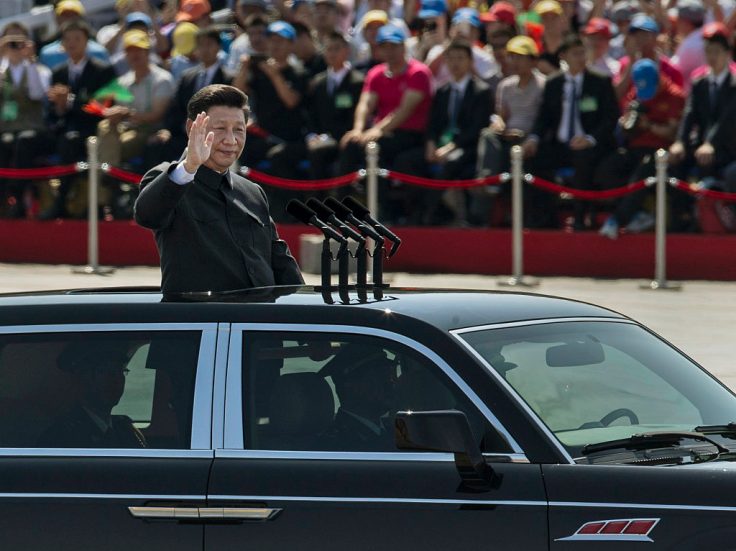When President Joe Biden pushed through nearly $400 billion in "green energy" subsidies last summer, he said the massive federal spending would help America compete with China. But auto giant Ford announced plans this week to use Biden's tax credits to make electric vehicle batteries with Chinese workers and technology.
Ford announced last week it is investing $3.5 billion to build a Michigan factory that will produce EV batteries in partnership with Chinese battery giant Contemporary Amperex Technology Co., Limited. The Chinese firm is not only providing technology but also sending equipment and workers to help build and run the factory, according to Ford.
Biden promised that his massive climate spending package, the so-called Inflation Reduction Act, would give the United States the ability "to compete with China for the future." The law, which Democrats pushed through Congress along party lines, has provisions that bar companies from qualifying for tax credits if any EV battery components were manufactured by a "foreign entity of concern," a provision aimed at quelling concerns that China will benefit.
But Ford expressed confidence Monday that its EV battery plant, 100 miles west of Detroit, will qualify for some of the Inflation Reduction Act's lucrative federal tax breaks. The company emphasized that it owns 100 percent of the factory because the deal with the Chinese firm is structured as a licensing agreement rather than as a joint venture, meaning Ford's Chinese partner does not have direct ownership.
That means Biden's Inflation Reduction Act could end up sending taxpayer money to America's biggest global adversary. The U.S. auto giant's reliance on the foreign firm reflects China's iron grip on the green energy supply chain—which has plagued the White House's efforts at "catalyzing America's clean energy economy" with federal subsidies.
Ford said the Chinese partnership is necessary to "build more EVs faster" and that battery technology and materials are "always imported."
Ford's announcement of the Michigan factory came after Virginia governor Glenn Youngkin (R.) in January withdrew his state from negotiations to host the plant. The Republican said he would not use taxpayer funds to "recruit Ford as a front for China."
Ford is working behind the scenes to build political support for the factory, the Washington Free Beacon has learned. The company urged at least two Republican Senate offices to publicly support the factory, but many Republicans on Capitol Hill remain unconvinced.
Rep. Cathy McMorris Rodgers (R., Wash.), the chairwoman of the House Energy Committee, told the Free Beacon that Ford's agreement with a Chinese company "raises a lot of questions."
"Creating American jobs and strengthening our energy security is vital, and the U.S. should be able to do this while minimizing China's involvement," Rogers said.
Sen. Marco Rubio (R., Fla.) on Tuesday called on the Biden administration to review Ford's Chinese licensing deal, saying it "will only deepen U.S. reliance on the Chinese Communist Party for battery tech, and is likely designed to make the factory eligible for Inflation Reduction Act (IRA) tax credits."
China's Communist government has over the years showered Contemporary Amperex Technology Co., Limited, with investments, subsidies, and favorable regulations. Zeng Yuqun, the company's CEO and now the world's biggest EV battery maker, also served on a Chinese Communist Party advisory committee, Fox News reported.
Whether the Ford factory ultimately qualifies for Inflation Reduction Act subsidies depends on guidelines that the Treasury Department is expected to issue in March, said Mercatus Center senior research fellow Christine McDaniel. Ford, which did not respond to a request for comment, has been lobbying the Biden administration for months to ease the law's restrictions on Chinese batteries and battery materials.
Meanwhile, Biden administration officials and congressional Democrats voiced support for the factory.
Energy Secretary Jennifer Granholm said Monday on Twitter that "bringing advanced manufacturing capabilities from overseas to the United States is key to our competitiveness, will stimulate our economy, and create[s] good-paying American jobs."
Sen. Gary Peters (D., Mich.) said in a statement Monday that the Ford factory is "an example of how Michigan can lead in strengthening our supply chains & national security by making this technology here at home—so we don't need to import it from China." Peters did not mention Ford's Chinese partner on the project.
Still, Ford's Chinese partnership isn't just attracting scrutiny from Republicans. Democratic senator Joe Manchin (W.Va.) is demanding Ford provide him with the contract detailing the licensing deal, an ask the Democrat says Ford is cooperating with.
